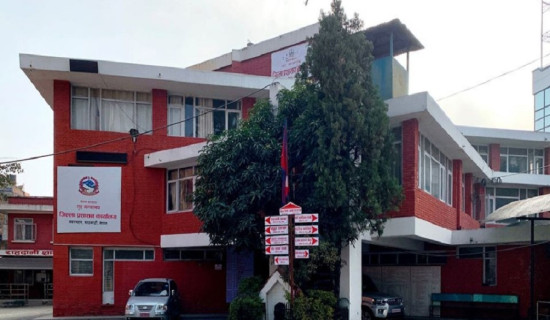- Friday, 27 February 2026
TikTok Ban Under Scanner
Nepal government’s recent ban on TikTok, a popular short-form video app, has triggered a new debate on the use of social media considered as viable tools for expressing opinions, showcasing talent, promoting business and conducting political campaign. But the government has said that TikTok has disturbed ‘social harmony, family structure and relations.’ The move has drawn flak from different sections of society, citing that it has curtailed the people’s rights to expression. Nepal has joined scores of countries that have banned TikTok for various reasons mainly the security concerns – collection and abuse of sensitive data. But mostly it is political, geopolitical and religious factors, impelling them to restrict people’s access to TikTok.
In February this year, the United States federal government asked its agencies to remove this app from government devices. The US that calls itself a land of free speech is afraid of the Chinese recreational site used by over 102 million Americans. There is consensus in the political establishment in the West that ByteDance, the parent company of TikTok, will pass the data to the Chinese government that ‘could manipulate them for intelligence-gathering operations and political propaganda.’ So far the collection of private information of users is concerned, this also applies to other social media and software companies such as Facebook, X and Google. The Biden administration is pressing TikTok to sell the Chinese ownership of app or face a possible ban. The US government has not yet prohibited the civilians from using it, fearing that it might clash with the spirit of First Amendment of its constitution.
Legal battle
In Nepal, TikTok ban has turned into political and legal battle. On Friday, at least 10 writ petitions have been filed at the Supreme Court against the government's decision. “The ban on TikTok is anti-constitutional, mala fide and arbitrary, and is totally opposed to the international human rights laws,” said a petition lodged by senior advocate Dinesh Tripathi. The apex court will begin hearing on the writs on November 21. The public opinion has been sharply divided on the TikTok ban. There is no dearth of people who hail the ban, but a growing number of critics have insisted that the government should strictly regulate its objectionable content instead of banning it. The contested issue will yet be another test of constitution that has transformed the youngest republic into one of the world’s freest societies.
Defending the move, Prime Minister Prime Minister Pushpa Kamal Dahal Prachanda said that the ban had been imposed following lengthy discussions and agreement between ruling and opposition parties. “It is based on practices adopted by established democratic and developed countries.” It was true that the social sites, including TikTok, were abused to the hilt for hate speech, misinformation, humiliation of public figures and character assassination that violate public decency and morality. As the media reports go by, the top political leadership was not satisfied with the way this site was used. They were sick of being the butt of TikTok users’ jokes.
During Prime Minister Prachanda’s visit to India, the two countries had an agreement to import Murrah buffalo into Nepal. But the social media users made it a laughing stock. They posted memes of Murrah buffalo on TikTok that generated significant number of viewers. Similarly, an image of CPN-UML chair KP Sharma Oli wrapped in a cloth of gold had gone viral on TikTok when Pashupati Jalahari scam had come to the fore.
As the TikTok is user-friendly and easily accessible even for literate people, it has become more popular than Facebook and other sites among the people. So is its impact on the masses. It has become a viable means of sharing ideas, experiences, disappointments and protests. The burning issues as well as state’s shortcomings have been well articulated through this site. The government decided to ban it in the wake of resurgence of anti-republican forces. The ruling and opposition leaders are wary of offensive comments and rumours against them and the federal system by pro-royalist Durga Prasai and his supporters through TikTok. They are also exploiting the social media for a showdown in Kathmandu on November 23.
Directives
The ban came three days after the government unveiled the ‘Directives on the Operation of Social Networking 2023’ that oblige the social media sites such as Facebook, Instagram, X, TikTok and YouTube to establish their offices in the country within three months of their implementation. They have to get registered with the Ministry of Information and Communication Technology while following a 19-point not-to-do list. The Directives were issued in response to their users’ call to delete the distasteful content fed by the platforms. Meanwhile, TikTok headquarters said that the ban would not just hamper its investment plans but also have a severe economic impact on Nepali content creators, who used the platform to market their products and keep their businesses afloat. “We address content and behaviour that violate our Community Guidelines through a combination of policies, technology, and moderation, which may include removing contents and accounts.”
There are both pros and cons of social media platforms. Detractors argue that social media have contributed to spreading fake news, divisive agenda and rumours, and manipulating users’ behaviours to suit the vested interest of some, eventually stifling the democratic polity. On the other hand, the social sites are considered the means of power of the powerless. They give a voice to the ordinary citizens who do not have an access to the mainstream media such as newspapers and television channels to air their genuine concerns. They spur free flow of information and exchange of ideas while engaging the people in open debate of public issues. These spontaneous activities of citizens are crucial for democracy to sustain, thrive and deepen. Therefore, it is prudent to enforce laws to curb their vices instead of banning them.
(The author is Deputy Executive Editor of this daily.)

















